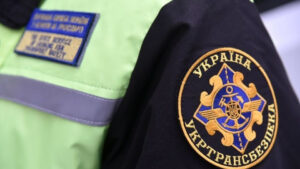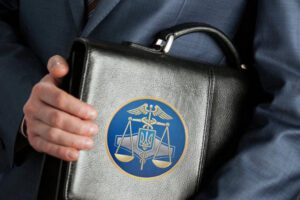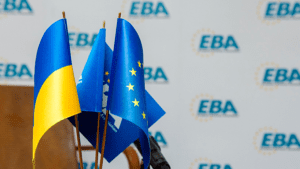
In 2023, the State Service for Transport Safety (Ukrtransbezpeka) generated a record amount of revenues to the state budget – UAH 637 million, which is 3.1 times more than in 2022.
This was announced by the head of the service, Yevhen Zborovsky, at a press conference dedicated to the publication of Ukrtransbezpeka’s public report for the past year.
“These are record figures in the history of the State Service of Ukraine for Transport Safety. We can see a comparison with 2022… (in 2022, Ukrtransbezpeka generated UAH 205.1 million in budget revenues – IF-U),” the head of the service said.
He clarified that most of the amount is made up of fines and penalties. Last year, they were imposed for more than UAH 800 million.
The revenue figure is UAH 378 million from penalties imposed during raids. In particular, UAH 329 million from raid inspections involving freight transport and UAH 49 million from inspections involving transport engaged in freight transportation. In 2022, the amount of revenues amounted to UAH 111 million and UAH 10.5 million, respectively.
In addition, the budget received UAH 228 million in fines from auto-fixation of violations of dimensional and weight parameters recorded by Weight-in-Motion vehicle weighing systems.
Zborovsky noted that the UAH 637 million revenue figure is twice the amount allocated from the state budget for the maintenance of Ukrtransbezpeka, including salaries to employees.
The head of the service also noted that more violations were recorded last year, both in the freight and passenger transportation segments.
“In both situations, we see that there has been an increase in the number of violations detected. Indeed, compared to 2022, the country’s economy began to recover in 2023. The number of transportation began to grow, and at the same time, the number of violations increased,” Zborovsky said.
Ukrtransbezpeka also reported that the right to install wheel locks on vehicles and accompany them to the weight control point, which was granted last year, contributed to the increase in the efficiency of its work in 2023. Violations of weight and size parameters are recorded using WIM systems – 50 such systems have been installed in 20 regions, mostly on roads built in 2020-2021.

The Tax Service has imposed UAH 1.65 billion in fines for violations in the use of payment transaction registers (PTRs) in the first half of 2023. This is already three times more than in all of 2021. The number of “cash registers in a smartphone” increased 4 times by 2021, while the number of traditional cash registers decreased by 5%.

The State Tax Service (STS) imposed 29,753 fines for violations in the use of PTRs totaling UAH 1.65 billion on entrepreneurs in the first half of 2023. This is already three times more than for the whole of 2021.
Entrepreneurs were fined for more than half of this amount – UAH 988.15 million – in August. It was during this month that the smallest number of inspections in 2023 was conducted – only 1640, but the largest number of fines was issued – 3336.

287.4 thousand cash registers and 554.6 thousand cash registers are in operation in Ukraine as of the beginning of December 2023. The surge in the installation of cash registers in 2023 occurred in September – +15% per month. We believe that this is due to the lifting of the moratorium on cash register checks in October, which was introduced at the beginning of the full-scale invasion.
The Ukrainian restaurant automation company Poster notes that most entrepreneurs were not ready for the return of inspections until the last minute.
“Many entrepreneurs waited until the last minute, explaining that this is not the first time the moratorium has been frozen or postponed. The demand for Poster’s PTR in chats and calls increased rapidly in the last week of September – 1.5-2 times more than usual.
Given that some entrepreneurs use physical cash registers and third-party integrations, we can assume that about a third of businesses were still not ready for the October 1 deadline,” said Rodion Yeroshek, CEO and co-owner of Poster.
Currently, the number of “cash registers in a smartphone” is almost twice as high as the number of regular ones. Compared to November 2021, the number of PTRs has increased 4 times, while the number of cash registers has decreased by 5%.
Despite this rapid growth, PTRs currently account for only 29% of the total number of checks. However, their number is increasing from year to year: for comparison, in 2021, the share of PTR checks was only 2.7%.

In total, 6.62 billion checks totaling UAH 2.3 trillion were issued in 11 months of this year. The total amount of PTR checks increased 1.5 times by 2021.

The State Tax Service carried out 186 actual inspections of filling stations, following which it imposed fines for UAH 83.4 million.
“In March this year, 186 actual inspections of filling stations were carried out, as a result of which UAH 83.4 million of fines were imposed. Also, 237,300 liters of fuel from illegal turnover for a total of UAH 5.4 million were seized,” the service said on its website.
As a result of the inspections, the tax office stopped the operation of ten filling stations and seized 40 units of equipment for UAH 4.8 million.
According to the service, among the main violations are trade in unaccounted excisable goods, transitions without the use of payment transactions recorders and sale of excisable goods without licenses. The tax authority also points to such violations regarding fuel storage as the lack of registration in the Unified State Register of flow meters and level meters of fuel in a place for which a license for storing fuel for the own needs or industrial processing has not been obtained.

The European Business Association (EBA) supports the idea of a systematic fight against smuggling and solving problems at customs, but considers a useful tool for this to be a reduction of the demand for illegally imported goods in the domestic market due to fiscalization and increased fines for the non-issuance of fiscal checks, as well as the mechanism of cashback, the association said in a release on Wednesday.
“A useful tool for solving this problem may be to reduce the demand for illegally imported goods in the domestic market of Ukraine. This can be achieved by strengthening control over the use of cash registers and gradually expanding the scope of mandatory use of payment transactions recorders,” Senior Manager of EBA Consumer Electronics Committee Viktoria Kulykova said.
According to her, the European Business Association has already asked the President to pay special attention to this issue, in particular – to prevent the weakening of reform and strengthen control and punishment for violations of legislation in this area.
According to the association, in the absence of fiscal checks and effective control over their issuance, unscrupulous entrepreneurs begin to evade the necessarytaxes and customs duties.
“Therefore, there is an urgent need to create transparent, equal, and civilized conditions for doing business, including the introduction of European practices for the fiscalization of payment transactions,” the association said.
However, the EBA representatives are convinced that the situation can be further improved: in particular, by increasing the fines for non-issuance of fiscal checks and introducing a mechanism to motivate customers to verify the authenticity of fiscal checks, the so-called cashback.
According to the EBA Consumer Electronics Committee, the volume of illegal imports of certain product categories amounts to 50-70%. To understand the scale of the problem, the Ukrainian budget loses about UAH 33-35 billion annually because of smuggling (UAH 11-14 billion from illegal petroleum products, UAH 7 billion from machinery, UAH 12 billion from alcohol, and about UAH 7 billion from medicines).

The Antimonopoly Committee of Ukraine (AMCU) has imposed a fine on Google LLC (99% owned by Google International LLC, the United States) in the amount of UAH 1 million for failure to provide information on time at the request of the state authorized representative of the AMCU.
As noted in the report on the website of the committee, such a decision was made by the provisional administrative board of the AMCU at a meeting on April 2.
“The size of the fine is determined by aggravating circumstances, namely by the fact that Google LLC has not provided the committee with the requested information for more than a year,” the report says.
This information was necessary for the AMCU to investigate the application of an individual entrepreneur regarding the blocking of his account in the Google My Business application.
The AMCU stressed that the failure of the respondent to provide information within a certain time frame makes it impossible for the committee to fulfill the tasks assigned to it, in particular, the timely, complete and comprehensive consideration of an application for violation of the legislation on protection of economic competition.
At the same time, it is noted that already within the framework of the consideration of the case initiated against the company for failure to provide information at the request of the committee, this information was provided by the defendant, which in turn was also taken into account by the AMCU when determining the amount of the fine.
“At the moment we are clarifying the details of this situation,” the press service of Google Ukraine commented to Interfax-Ukraine.

The Antimonopoly Committee of Ukraine has imposed a fine of UAH 4.7 billion on the operators of the filling station network, which are part of the Privat Group, for anticompetitive concerted actions in setting prices for petroleum products.
According to the committee’s statement on Tuesday evening, in particular, a fine was imposed on PTF Avias LLC, Trading House Avias LLC, Prom Garant Plus LLC, Alliance Evolution LLC, PJSC Ukrtatnafta and 169 filling station operators (including PJSC Ukrnafta).
The committee said that within the framework of the case opened in 2016, it was established that in the field of retail trade in light petroleum products in Ukraine, there is a system of cashless payments with scratch cards and Avias fuel cards. About 1,625 filling stations take part in this project, which operate under different brands in all regions of Ukraine, occupying a 25% share of all filling stations in the country.
“The committee determined that the Avias project is organized, coordinated and operates with the aim of harmonizing the price and trading behavior of the participants,” the committee said.
In particular, Keropur®ENERGY gasoline and diesel fuel were sold throughout the network, the same prices were set at a time regardless of the brand of the filling station and the region, and there was also a “center” that included several business entities located at the same address in the city of Dnipro, where detailed planning and coordination of network activities was performed.
In addition, the committee found a significant number of standard, basically identical contracts for the sale and purchase of petroleum products and property, lease of filling stations and financial assistance, and also established that individuals, who held the positions of director, founder, signatory, accountant, manager, etc, often changed each other and worked simultaneously in several companies participating in the project.
In addition, the composition of legal entities – participants in the project was constantly changing (without changing the personal composition). This happened through the same liquidators and at similar addresses of the latest registration in Kharkiv.
The committee found that filling station operators, including Ukrnafta, purchased light oil products from Ukrtatnafta at prices higher than similar imported fuel.
“Such coordinated behavior of the Avias project participants violates competition between operators of filling stations in the market. Therefore, prices for light oil products in the Avias network were set in anti-competitive conditions. Taking this into account, the committee approved to impose fines on the above-mentioned business entities in the total amount of UAH 4.7 billion for these violations,” the committee said.
“Today we are summarizing the result of a great deal of work and many years of legal confrontation between the Antimonopoly Committee and the participants in conspiracy on the Ukrainian fuel market. Despite complicated circumstances and enormous resistance from the defendants, we completed the investigation and made the decision,” Chair of the committee Olha Pischanska said after the meeting.